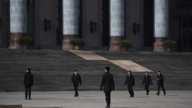【新唐人2014年02月08日讯】中共总书记习近平接班前夕,在“北戴河会议”上,与前任领导人达成共识,换届后立即“收拾民心”。他强调,虽然内忧外患缠身,但“死穴”是失尽民心,随时会面临“中国版茉莉花革命”的危险,所以习上任后大力反腐倡廉。
2月4号,香港《经济日报》引述一位曾参加2012年“北戴河会议”官员的话说,习近平在会议上强调,中共当前面临的内忧外患与1948年的“国民党”极为相似,处于“失尽民心”阶段。
会议后,习近平与中共前领导人达成共识,决定十八大换届后,尽快收拾民心。所以习近平上任后,拉开所谓的“反腐”序幕。
报导还引述北京观察家的话指出,如何改变民众对中共官员腐败印象,习近平认为,扭转公众认知,需相当长时间,但是,时间不站在中共这边。
北京时政观察人士华颇:“说明中共对眼前的社会现状和形势是有清楚的认识的,因为江泽民执政13年,搞的腐败政治,大力推行权贵经济,垄断经济,搞的民不聊生,所以已经到了天怒人怨,已到非常危险的时刻了。”
前中共党魁江泽民时代,特权横行,腐败成了中共核心的凝聚力,国有资源被几大权力家族瓜分,江派势力如曾庆红、周永康等,成为中国社会巨贪家族。
北京宪政学者陈永苗认为,当下中共官场和1948年“国民党”相比,腐败的原因和背景还是有区别的。
北京宪政学者陈永苗:“1948年它的形势不是因为它统治这么糟糕,而是它打了10年的外仗,然后通货膨胀,各种社会腐败,都是跟打仗有关系,但是现在的中共有像48年的腐败,它跟打外仗没有关系,是因为它自己弄的糟糕。”
早在2011年,“英国皇家政治事务研究院”亚洲事务主管曾说,中共失去了中国99%人口的民心。对此,他们感到担忧。
北京时政观察人士华颇指出,这种状况在“胡温时代”已经非常明显,可是他们有心无力,尽管温家宝为收拢民心,无数次疾呼政治体制改革,但是实现不了。
华颇:“所以习近平要接掌江山的时候,他必须要有清楚的认识,所以他一上来,首先以反腐为突破口,大力打击这些利益集团,阻碍改革的这些权贵们,所以暴露出来,春节(中国新年)期间中纪委没有闲着,接连发文要继续反腐败。”
1月31号(大年初一),中央纪委监察部网站刊登消息说,南京市委原副书记兼市长季建业,涉贪被开除党籍,并移送司法机关处理。
隔天的2月1号,中纪委监察部再发消息表示,要严厉惩处一切腐败份子,加大国际追逃追赃力度,让“腐败份子无处藏身”。
2月2号,中共喉舌《新华社》报导说,审计署要求各级审计机关,严查滥用职权、贪污受贿等问题。
中共自“十八大”至今,反腐动作频频,一些官员因举报落马。但中国公民要求官员公示财产却遭抓捕。“国际特赦”组织刊文批评中共为了维护政权、打压异己,是“虚伪的反腐”。
华颇指出,中共的“反腐”,只是为了保共产党江山的稳定。而要求财产公开的这些公民走向街头,触犯了中共大忌。
华颇:“因为中共对街头政治谈虎色变,所以中共认为,我是可以反腐败,我可以去让他们官员财产公开,但是你们却不成,因为他们搞就会把局面搞乱了,所以习也会对民间健康力量进行打压,因为他们要稳定局面,维稳还是第一位的。”
华颇表示,虽然中共这次破格大力反腐来收拢民心,但是中共多年来对民众的血腥镇压,早已是民心向背。
采访编辑/李韵 后制/李勇
The CCP attempted to win popular support by the anti-corruption movement
At the “Beidaihe Conference" prior to
the Chinese Communist Party (CCP) head Xi Jinping
taking power, Xi and other CCP leaders achieved
a consensus of immediately “winning the people’s support"
after he officially took the head position.
Xi emphasized, despite confronting
domestic and external troubles,
CCP’s “dead aperture" is losing people’s support,
which leads to the danger of
“Jasmine Revolution of Chinese Version" at any time.
So after Xi took the head position of the CCP,
he strongly launched the movement
of anti-corruption and building a clean government.
On February 4th,
Hong Kong-based Economics Daily Newspaper cites
an official who attended the CCP’s high-rank
Beidaihe Conference in 2012 and reports,
Xi Jinping emphasized in the Conference,
the domestic and external troubles the CCP is facing now
are very similar to the Kuomintang (KMT) in 1948,
which were all at a stage of losing people’s support.
During the conference, Xi Jinping achieved consensus
with the former CCP leaders, and decided to
win back people’s support as soon as possible
after the 18th CCP Congress.
So after Xi Jinping took the head position,
he launched the movement of anti-corruption.
The report cites a political observer in Beijing and points out,
as far as how to change people’s impression on
corrupt officials is concerned,
Xi Jinping says, to renew the people’s perception
about the CCP will take a considerably long time.
However, time does not wait for the CCP.
Beijing Political Commentator Hua Po: “This shows
the CCP has a clear realization
about current society’s status and situation.
During 13 years of holding power,
Jiang Zemin carried out policies of corruption politics,
cronyism and monopoly economics,
which made the people destitute.
So this has reached a very crucial point in time,
a very risky moment,
when the gods are angry and the people are resentful."
During Jiang Zemin’s time, the power of privilege is prevalent
and corruption becomes the cohesion of the CCP.
State-owned resources are partitioned
by several powerful families including Jiang’s faction figures
Zeng Qinghong and Zhou Yongkang
which leads their families to
become corrupted with a huge amount of money.
Bejing constitutional scholar Chen Yongmiao says,
compared with the KMT in 1949, the causes and background
of corruption in the CCP’s officialdom are quite different.
Chen Yongmiao: “the situation in 1948 resulted
from 10 years’ war against the Japanese,
which was enhanced with monetary inflation
and all sorts of social corruption.
However, the current CCP have a similar degree of corruption
but without external incentive.
It is the CCP themselves
that are responsible for the bad situation."
In 2011, the Chief of Asia Department of
“British Royal Politics Institute" said,
the CCP were losing 99% of Chinese people’s support
and they take the issue seriously.
Hua Po points out, such a status has been very obvious.
But they have the mind but without the strength to solve it.
Although Wen Jiabao called for
implementation of political reform
in order to win back the people’s support,
this was not realized.
Hua Po: “So when Xi Jinping took power,
he must have a clear understanding.
After he took power, he chose anti-corruption
as a breakthrough point, strongly hitting these interest groups
and the bigshots blocking reform.
During the Chinese New Year,
the Commission for Discipline Inspection of
the Central Committee of the CCP(CDICC)
continually published articles
advocating anti-corruption without stopping."
On January 31st (The first day of Chinese New Year),
the website of Supervision Ministry of CDICC
published a piece of news,
the deputy CCP head and the full mayor of Nanjing City
Ji Jianye’s case is transferred to the Justice Department
for processing and he was stripped of his CCP identity.
On the next day, the website of Supervision Ministry
of CDICC again published an article,
which spoke of punishing all corrupt officials
and enhancing the strength of pursuing and catching
corrupt officials who escape overseas,
which will make sure “corrupt officials
have no way of hiding themselves."
On the third day, the CCP’s mouthpiece Xinhua News Agency
reports, the Ministry of Auditing requires
each level’s audit departments to strictly investigate
the abuse of administrative power, corruption and bribery.
Since the 18th CCP Congress, the CCP implemented
many new anti-corruption measures
and some officials have fallen due to the reporting.
But Chinese citizens requesting official’s assets
be published are arrested. AMNESTY published articles
to criticize the CCP for “hypocritical anti-corruption"
which is focusing on extending the regime
and oppressing the dissidents.
Hua Po says, the CCP’s anti-corruption is only for
maintaining the CCP’s regime.
When these citizens walk on the streets for
publishing officials’ assets,
this offends the CCP most seriously.
Hua Po: “Because the CCP fears street politics extremely.
so the CCP says, we can oppose corruption
and ask officials to publish their assets, but you citizens
cannot because this will make the situation chaotic.
Xi’s authorities also oppress healthy civil forces
which maintain stability ,
the number 1 of all issues."
Hua Po says, although the CCP strongly
opposes corruption to win the people’s support,
the CCP’s bloody suppression of people
has caused the people to lose their support for the CCP.
Interview & Edit/LiYun Post-Production/LiYong



























